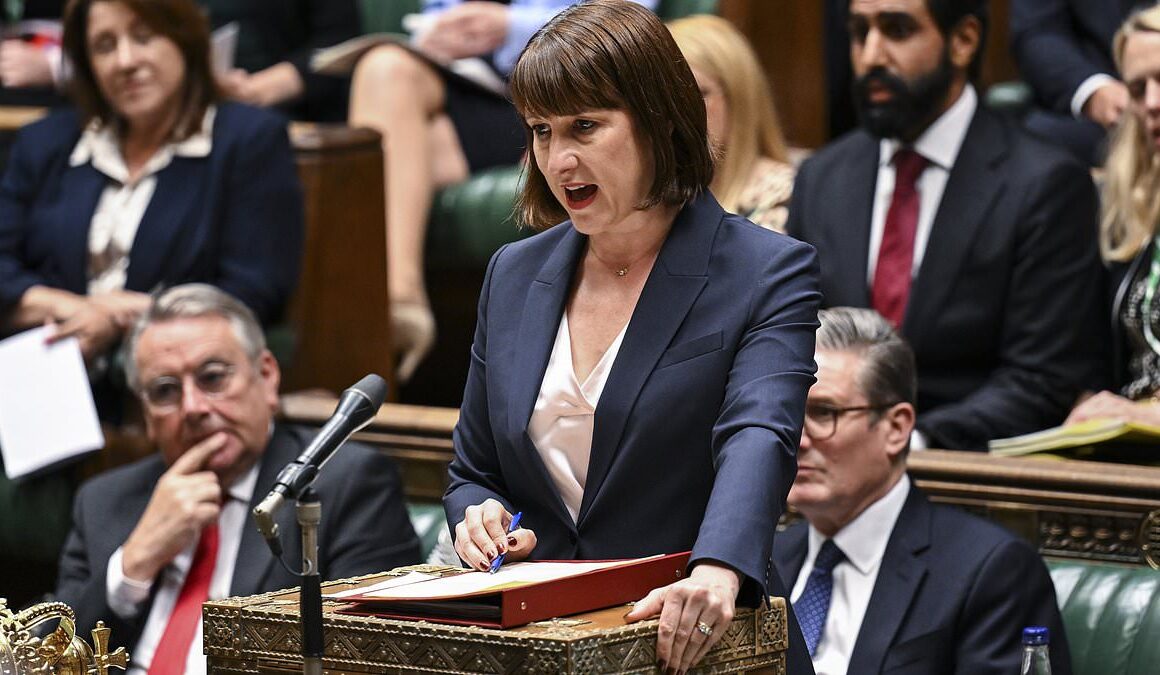Rachel Reeves was accused of a ‘cruel’ raid on pensioners last night after she axed the winter fuel allowance for ten million older people.
In a shock move, the new Chancellor announced the payment – worth up to £300 a year – will be means-tested, meaning that pensioners with incomes as low as £1,000 a month will no longer qualify.
Ms Reeves claimed the raid was needed to help fill a £22billion ‘black hole’ in the public finances left behind by the last Conservative government.
She warned of more pain in her first Budget on October 30, saying there would be further ‘difficult decisions’ on ‘spending, welfare and tax’.
The Chancellor declared: ‘If we cannot afford it, we cannot do it.’

Chancellor Rachel Reeves speaking in the House of Commons to give her statement

She was accused of a ‘cruel’ raid on pensioners last night after she axed the winter fuel allowance for ten million older people

Rachel Reeves during a press conference following her statement to the House of Commons on July 29
Despite the apocalyptic warnings about the economy, Ms Reeves conjured up almost £10billion to fund inflation-busting pay rises for the public sector, including a 22 per cent hike over two years for striking junior doctors.
Her statement triggered an angry reaction from ex-chancellor Jeremy Hunt, who said claims of a spending black hole were ‘fictitious’ and accused his successor of ‘trash-talking the economy’.
Mr Hunt warned that she was ‘laying the ground for tax rises’ in the autumn.
Ms Reeves also faced a backlash from campaigners, who warned that Ms Reeves would push pensioners into poverty.
In future, only those who qualify for pension credit or similar benefits will retain the winter fuel payment, meaning that those with incomes of more than £11,344 will lose out.
The annual payment, introduced in 1997, is currently paid to 11.4 million people each year.
But that will fall to just 1.5 million, saving £1.5billion.
Tory MP Dame Harriet Baldwin, former chairman of the Treasury committee, accused the Chancellor of making a ‘chilling political choice… to take away the winter fuel allowance from a 90-year-old on an income of £10,000 a year’.
Dennis Reed, of pensioners’ campaign group Silver Voices, said the Chancellor’s attempt to blame the ‘cruel’ cut on the last government ‘does not wash’.
He added: ‘The scrapping of the allowance for most pensioners is a targeted attack on those who have devoted their working lives to this nation and who are least able to fight back.
‘The Chancellor knows that this measure will greatly increase pensioner poverty.’
Caroline Abrahams, of Age UK, said that while some wealthy pensioners could afford to lose the payment, millions more would have to make a ‘horrible’ choice between heating and eating.
She said the plan would ‘jeopardise the health’ of poorer pensioners and urged a rethink.
The Chancellor said she had been forced into making difficult cuts by the profligacy of the last government and defended the raid on pensioners as ‘the fair and right decision’.
Ms Reeves yesterday published a 25-page ‘Treasury audit’ of the Government’s spending commitments, which she said showed Tory ministers had hidden the truth from both the public and watchdogs like the Office for Budget Responsibility.
She told MPs it had uncovered ‘£22billion of spending this year that was covered up by the Conservative party’. And she warned that failure to address the ‘black hole’ would put ‘financial stability’ at risk.

Her statement triggered an angry reaction from ex-chancellor Jeremy Hunt, who said claims of a spending black hole were ‘fictitious’

Chancellor of the Exchequer Rachel Reeves in her office at no 11 Downing Street ahead of her statement to the House of Commons

Chancellor of the Exchequer Rachel Reeves during a press conference following her statement to the House of Commons
‘They ducked the difficult decisions, put party before country, and continued to make unfunded commitment after unfunded commitment, knowing that the money was not there,’ she said, adding that the Treasury reserve had already been committed three times over this year.
Mr Hunt hit back: ‘Today’s exercise is not economic, it is political. She wants to blame the last Conservative government for tax rises and project cancellations she’s been planning all along.’
Critics pointed out that almost half the ‘black hole’ was accounted for by Ms Reeves’s £9.4billion commitment to fund inflation-busting pay rises for six million public sector workers.
A further £350million was committed yesterday in a bid to end the junior doctors’ dispute, with striking medics now in line for a 22 per cent backdated rise over two years.
Mr Hunt said Labour had ‘caved in to the unions on pay’.
Ms Reeves defended the pay hikes, saying that industrial action in the NHS alone had cost the economy £1.7billion last year.
MPs were told that cuts this year would save £5.4billion, including £3billion of unspecified ‘efficiencies’ from departments.
The savings are dwarfed by the cost of the public sector pay settlements. And they potentially leave Ms Reeves with a further £16billion to find this autumn.
At a press conference in the Treasury last night, the Chancellor refused to rule out further tax rises.
‘I don’t want to increase taxes, but we are in a position where there is a £22billion gap,’ she said.
The Chancellor insisted that the public sector pay rises would not fuel inflation – which currently stands at just 2 per cent – saying they were in line with those in the private sector.
She also hit back at accusations that the potential axing of infrastructure projects was anti-growth, saying: ‘There’s nothing pro-growth about making commitments to do things when the money simply is not there.’








